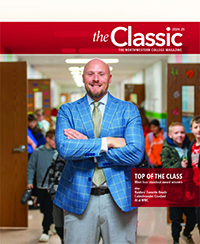Programming team wins at regional site
Tuesday, November 15, 2005
John Calsbeek, a home-schooled high school student from Orange City who is taking classes at Northwestern, and Ben Kester, a freshman actuarial science and computer science major from Urbandale, Iowa, combined to solve three of the nine problems in the five-hour competition. They placed 33rd out of 182 teams among all the sites in the North Central region.
“John and Ben were fantastic,” says Michael Wallinga, instructor in computer science at Northwestern. “They definitely have the intelligence and ability to do well in a contest like this. I thought their age and inexperience might hold them back a little bit, but they were able to solve the problems and to code them in the necessary language without any errors. They solved all three of their problems on the first try, which was a key to their success.”
Another Northwestern team placed sixth at the competition site and 76th in the region. The team included Aaron Ewoldt, a junior computer science major from Hospers; Kim Miller, a senior computer science major from
A third Northwestern squad, consisting of Andrew Greene, a senior computer information systems major from Orange City, and Brad Odens, a sophomore computer science major from Sioux Falls, tied for 13th at the University of South Dakota site.
Wallinga describes the competition problems as great brain-teasers. He says performing well at the competition requires students to demonstrate creativity, teamwork, the ability to determine which problems are within their capability to solve, and the ability to work under time pressure.
Huddled around a single computer, teams of two or three students collaborate to deduce the requirements, design test beds and build software systems that solve complex, real-life problems under the scrutiny of expert judges. The winning team is the one that solves the most problems in the fewest attempts within the least amount of time.
Over 5,000 college and university teams from 71 countries are participating in the competition, which is in its 30th year and is sponsored by IBM. The top 80 teams will compete in the world finals in

